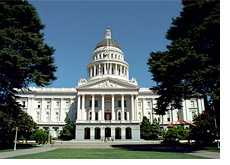California Must Close a $20 Billion Dollar Budget Gap
 Just a decade ago, many states were riding high due to a surge in the US economy.
Just a decade ago, many states were riding high due to a surge in the US economy. California was no different, as the state was bathing in the proceeds of a lucrative "dot-com boom". The state was home to many different Internet start-ups, and was able to reap the rewards that came from thousands of the state's residents becoming newly-minted millionaires and billionaires.
There was tax relief in the 1999-00 California budget, in addition to spending increases in health care, social services and education. Things were good.
Things, as you are certainly painfully aware, have gotten very bad in many states over the past couple of years. California has been especially hard-hit, first buckling after the collapse of the dot-com bubble, and now on the verge of imploding less than a decade later, seemingly unable to cope with the negative effects of the "Great Recession".
Tax relief and spending increases have quickly turned into tax increases and harsh spending cuts.
The state seemingly grinds to a halt on an annual basis now as legislators figure out how to close massive budget gaps. 2010 will be no different, as the state has an estimated $20 billion dollar budget gap to close through the summer of 2011.
IOUs, accounting tricks, painful spending cuts and tax increases have been used to close the gaps in past years.
In 2010, Gov. Arnold Schwarzenegger is proposing more painful spending cuts and large pay cuts for state workers.
In addition, Schwarzenegger will ask the federal government to contribute billions of dollars to help fill the budget hole. Many people feel that it is unlikely that the federal government will actually do this.
The state of California has a HORRIBLE credit rating as well, meaning that the cost of servicing their debt has skyrocketed over the past decade.
Fitch currently has the state's GO Bonds (General Obligation, long-term) rated at BBB. Moody's currently has a rating of Baa1, while S&P has a rating of A.
The state of California currently has about $84 billion dollars in total long-term bond debt, with most of this coming in the form of the state's General Obligation bonds.
With each credit downgrade, the cost of servicing the state's debt increases, thereby creating even more of a strain on California's finances.
Fitch, for instance, currently has a rating of BBB on the state's general obligation bonds. This is just one grade above the "junk" level.
To put it into perspective, no other state has a worse credit rating than California.
How did things ever get to this point?
The implosion of the dot-com bubble early in 2000, the post 9/11 recession, the subprime mortgage fiasco, the implosion of the California real estate market, an inability to reign in expenditures, a divided legislature and the "Great Recession" are just some of the reasons why the state of California has been brought to its knees.
In January of 2000, California had a state unemployment rate of just 5.0%.
Nearly ten years later, and this figure has jumped to 12.3%.
Corporate tax revenues, sales tax revenues and personal income tax revenues have been obliterated, sending the state's finances into free fall.
Some people actually believe that there is a chance that California might default on its debt obligations:
Bill Watkins of the Center for Economic Research and Forecasting at California Lutheran University believes that California "is now more likely to default than it is to not default".
This seems pretty unlikely to me, given the catastrophic consequences of such an event taking place (not only for the state of California, but for the entire country as well), but the mere fact that we are even entertaining such a possibility shows you how bad things have gotten over the past ten years.
Where does the state go from here? The state's 2/3 budget rule (a two-thirds vote in the legislature is required to pass a budget) means that it becomes nearly impossible to implement wide-scale changes that might actually get to the heart of the issues with these massive budget gaps.
It appears as though California will just attempt to hang on for the time being, and hope desperately for an upturn in the nation's economy.
You really have to wonder, though, what would happen to a state like California if we experienced a double-dip recession or, even worse, an L-shaped depression similar to what Japan experienced in the '90s.
Photo: hsivonen
Filed under: The Economic Meltdown



